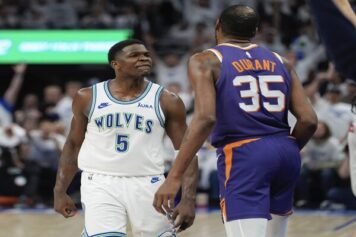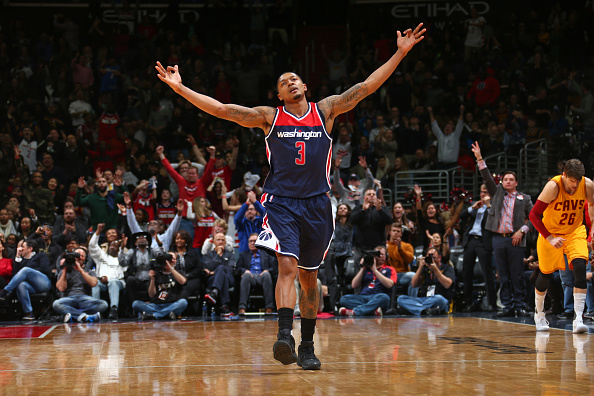If you live on the East Coast, you were probably asleep when the Boston Celtics sent Marcus Smart to the Memphis Grizzlies and acquired Kristaps Porzingis from the Washington Wizards, who received Tyus Jones, Danilo Gallinari and Mike Muscala in a three-team deal late Wednesday night. Add in Thursday’s NBA draft and the new CBA and this is shaping up to be a chaotic couple weeks in the Association.
Bradley Beal And Chris Paul Trades
It began with Bradley Beal being traded from the Wizards to the Phoenix Suns last week for Chris Paul and Landry Shamet. Paul is now on his way to the Golden State Warriors for Jordan Poole, according to the latest Shams Charania report.
This league is drunk and will remain so until summer league.
Teams that are contenders with older players are going all in. See the Suns, Warriors, and Celtics.
Before the end of Thursday’s draft, the Portland Trail Blazers will likely send superstar Damian Lillard somewhere. He and his camp are hoping it’s the Miami Heat. But the Trail Blazers are under no obligation to move Lillard there. They’ll send him wherever they can extract the best deal.
This is all a result of the new CBA deal that has been agreed to between the league and NBPA. The new deal essentially created a hard salary cap which punishes teams from going above the luxury tax with a second tax apron.
New CBA Causing Teams To Pivot
The second apron line of $17.5 million over the luxury tax introduces restrictions on roster construction. This mechanism is meant to penalize teams such as the Milwaukee Bucks, Los Angeles Clippers and Warriors, all of whom are paying deep into the tax for championship contenders this year. Teams that exceed this apron will not be allowed to use their taxpayer mid-level exception, cannot sign buyout players during the season, and cannot take more money back in trades.
You’ll see players that have player options for big dollars opt out to become free agents. But if they want to stay with their current team, they’re going to come back for more total money but less per year. See: Khris Middleton and James Harden.
The Chris Paul deal gives the Warriors long-term cap relief, getting off Jordan Poole’s contract, while increasing next year’s title odds slightly. Now, this all depends on what happens with Draymond Green, who has opted out of his deal and become an unrestricted free agent.
The sweet spot for trades in years past was approximately that $20 million to $30 million salary range, where you were getting a good player and something that would get fans excited. General managers could sell progress to their owners, etc. But all those rich deals signed for a total of $80 million to $120 million are coming home to roost.
Owners can’t justify paying luxury tax for a team that isn’t contending. In years past, at this time at least 10-12 teams would have cap space. Now, less than five teams have cap space unless they do some serious contract restructuring and rescinding of players.
To compete you need one of the league’s 10 best players, another ascending player on a rookie max extension, and a bunch of players performing above their contract level so you can afford to pay for another high priced All-Star level player. But if you’re overpaying in any of these areas you’re in cap hell and, unless you have control of your draft, no real way of getting out.



